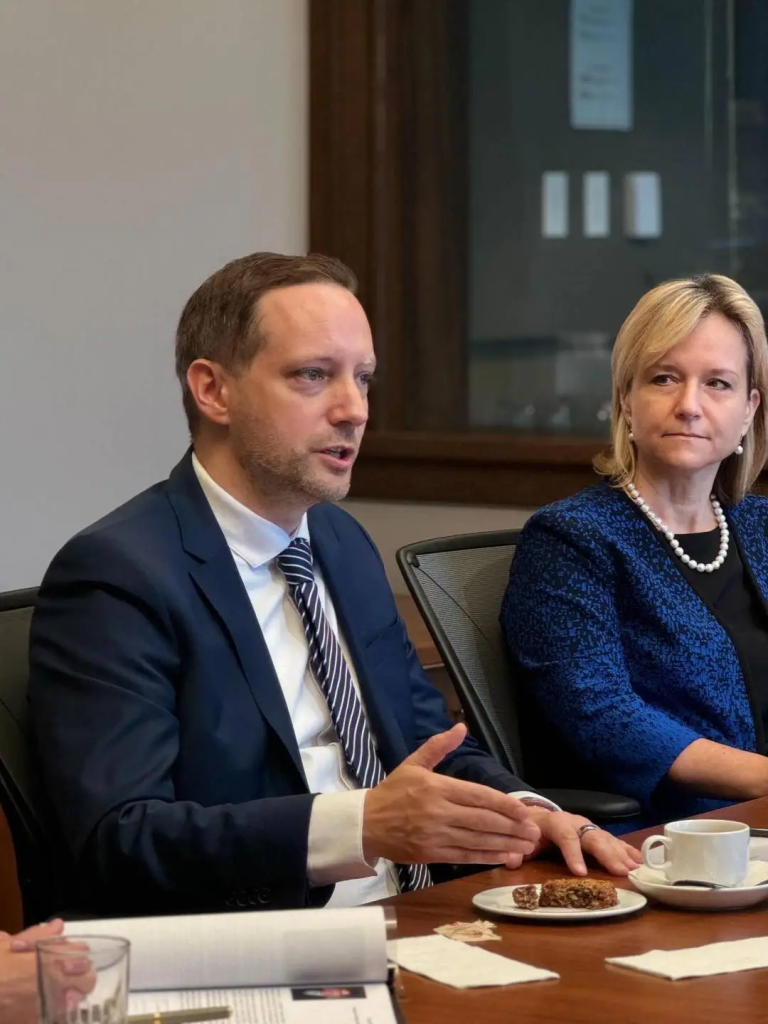
Dr. Tristan Azbej, Hungary’s state secretary for the aid of persecuted Christians, visited Ottawa with a mission: to rally support for Christians facing persecution around the world. On October 3 and 4, Azbej met with Canadian lawmakers and church leaders, concluding his visit with a presentation at the Cardus Institute titled “10 Years after Genocide: Christian Present and Future in a Post-ISIS Middle East.”

Dr. Tristan Azbej, Hungary’s State Secretary for the Aid of Persecuted Christians, engages in a forward-looking discussion with Conservative MP Garnett Genuis, Shadow Minister for International Development, and other Conservative MPs in Canada’s Parliament. The meeting highlighted appreciation for the Hungary Helps program, which provides vital support to persecuted Christians globally.
In an interview with *The Catholic Register*, Azbej highlighted Hungary Helps, a government-backed organization launched in 2017 that provides humanitarian aid to persecuted Christians. He called on Canada and other Western nations to join the effort, particularly in supporting the 300 million Christians who face discrimination or threats due to their faith.
Azbej recalled how the atrocities committed by ISIS in Iraq and Syria between 2014 and 2017 motivated Hungary to act. During this period, over 200,000 Christians fled their homes in the Nineveh Plains under the threat of execution, forced conversion, or paying a tax imposed by ISIS.
Hungary Helps aims to break the “wall of silence” many governments maintain regarding Christian persecution, encouraging global action.
He criticized the lack of international attention to this issue, noting, “It seems like the big international aid programs are blind to Christian persecution, acting as if anyone else’s life deserves protection but Christians.” He suggested that this reluctance might stem from the fact that discussing Christian persecution is often seen as politically incorrect in the West.
Hungary’s current presidency of the Council of the European Union provides a platform for pushing this issue to the forefront.
Azbej has already addressed the council’s international development committee, advocating for direct engagement with faith-based humanitarian organizations working in crisis areas.
Through over 350 projects in 55 countries, Hungary Helps has provided aid to more than two million people.
In the Middle East, the organization has launched numerous post-war reconstruction efforts, including a school for displaced Christians in Iraq and infrastructure support for Christian families in Syria.
Hungary Helps has also expanded its work across Africa, including opening humanitarian centers in Chad and Ethiopia, and providing emergency assistance in Nigeria and the Sahel region, which has recently seen a surge in jihadist violence.
Azbej’s dedication to supporting persecuted Christians is deeply personal. He explained that his Catholic family suffered under communist rule in Hungary, and he draws inspiration from the Christian martyrs who resisted oppression. His office houses a chapel dedicated to persecuted Christian martyrs, including a relic of Zoltán Meszlényi, a Hungarian bishop who was tortured and killed for defying the communist regime.
For Azbej, Christian persecution is not a distant issue—it is a reality that continues to affect millions today. Through Hungary Helps, he hopes to inspire global action and solidarity for those who suffer for their faith.